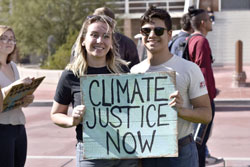When thinking of global warming, my first thought, and maybe a few others’ are: I don’t hate it, if its 60 degrees on Christmas Day. But the reality of it is that global warming is having immense effects on the environment and its inhabitants. So, just because we appreciate when its warm in December, it doesn’t necessarily mean we should be okay with it.
In order to have life on earth, green house gasses hold the heat we need. They trap the gasses and heat that are necessary, and make earth a average of 59 degrees Fahrenheit.
An article written by Elizabeth May and Zoe Caron on dummies.com states that because of our own human contribution of greenhouse gasses to the atmosphere, we have increased the amount of greenhouse gasses by almost 35%.
Plainly stated, the more greenhouse gasses we have, the warmer the temperature of earth gets. The two main gasses to worry about, that humans can produce both actively and naturally, are CO2 (Carbon Dioxide) and CH4 (Methane). The same article from May and Zoe explains that CO2 is produced through “from burning fossil fuels, such as coal and oil. It also occurs naturally as it flows in a cycle between oceans, soil, plants and animals” and that MH4 is produced “by rotting garbage and wastewater, gas from livestock, and rice crops. Swamps and anything that decomposes without air naturally creates methane.”
While most of the main changes we all can make to reduce our carbon footprint are easiest when we become homeowners, there are a few easy changes we all can make without thinking and we can save the environment at the same time. First, instead of ordering that juicy hamburger at Five Guys, or buying steaks from Wegmans – try a vegetarian option instead.
An article on the National Resources Defense Council’s website explained that livestock products “are among the most resource-intensive to produce” – therefor a meat-free meal can help save the environment.
 When making the decision to purchase a car, looking into ecofriendly options can save the environment as well. Both hybrids and electric cars save both fuel and money, therefor as a fresh college graduate you could be saving money and the environment all in one!
When making the decision to purchase a car, looking into ecofriendly options can save the environment as well. Both hybrids and electric cars save both fuel and money, therefor as a fresh college graduate you could be saving money and the environment all in one!
Lastly, an easy way for college students to cut down on greenhouse emissions is by walking. Instead of taking the five-minute drive from the dorms to campus for class, take a leisurely walk. You’re saving both gas, and greenhouse emissions from escaping your car (and if were being honest, you probably wont find a parking spot either).
The biggest reason we should be taking these small steps to reduce our carbon footprint is because global warming is irreversible. Once the damage is done, it is done and we will have to live in the effects of what we can prevent now.
With a new president taking office, these concerns about irreversible effects are now more prominent. From an article on scientificamerican.com, his plans are explained: “They include ‘canceling’ American involvement in the Paris climate accord, reviving the coal industry and rolling back federal environmental regulations. If Trump follows through, scientists say it could have a profound long-term effect on the planet.”
Junior criminal justice student Christen Piersanti explained that: “My concern is that President Trump isn’t going to make climate change as much of a priority as it should be, and as of now, that’s how its shaping up. It’s a worldwide movement that needs full participation, and without Trump’s support, its just one less country helping this global cause.”
Riley Bragger, a sophomore communication major, had similar views, stating, “Its so easy for us all to take the little steps we can to be as energy effective and efficient as possible. I didn’t know that eating less meat could help decrease greenhouse gasses, but that’s definitely something I can do and we all can do without thinking twice.”
So while we all enjoy warm weather, we should think twice about what it means for our country, and start thinking about what we can do to save our planet.
IMAGE TAKEN from gizmodo.com
IMAGE TAKEN from wildcat.arizona.edu




